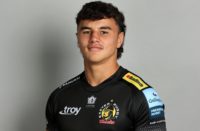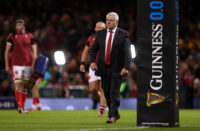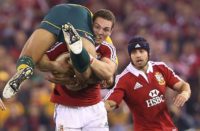When they come to write the colourful history of Anglo-Welsh rivalry, one of England's forgotten full-backs will justify a chapter all by himself.
On a bright January day at Cardiff Arms Park 24 years ago, Simon Hodgkinson did something which had never been done in a Wales-England match before and which has not been done since. He took seven penalty shots at goal and nailed them all.
England had won in Cardiff for the first time in almost 30 years and their unassuming match-winner ought to have been lauded for a unique achievement. Instead Hodgkinson left the Arms Park that day under orders, like every other England player, to say nothing.
Previous England teams had never failed to make themselves available at the Arms Park, usually to praise their opponents, sometimes to talk about what might have been but always from a defeatist position save for the one draw which interrupted their run of 13 losses.
Now, when at long last they really did have something to shout about, England kept shtum. Will Carling and a cabal of senior players headed by Brian Moore had decided to boycott the BBC because they had refused to pay a sum of £5,000 into the newly-formed players' company.
That widened post-match to a blanket ban on any interviews. Nobody was to say a word and, as the hero of the hour, none suffered more than Hodgkinson, caught in the crossfire of a political row between England's increasingly militant players and the RFU, suitably outraged at the players' rebellion.
It could not have been more obvious had they all emerged from the dressing-room wearing muzzles. The Union hierarchy condemned the team's behavior, accusing them of hi-jacking the occasion.
Wales, too embarrassed by the sheer dominance of the English pack and the scale of their defeat (25-6), barely noticed the sound of after-match silence. For the first Five Nations' match of the Nineties they had thrown a pair of teenagers in at the deep end – Scott Gibbs and Neil Jenkins.
For the last Five Nations' match at the end of the same decade, they would deliver the try and the conversion which scuppered an English Grand Slam at Wembley. By then Hodgkinson had been consigned to history, the perfect seven out of seven against Wales failing to extend his England career by more than a few months.
His Nottingham team-mate and the man regarded by the RFU as the chief agent provocateur, Brian Moore, has since expressed ‘regret' for how the ‘we-don't-talk-to-anyone' stand denied Hodgkinson his hour in the sun.
“Perhaps the one regret I had was on behalf of Simon Hodgkinson,'' Moore wrote in an autobiography. ‘'His part in the strength of England rugby at the time has always been considerably devalued for all sorts of reasons.
“He was very special to that England side. He was no great shakes as an attacking force but he was a superb footballer and a brilliant goalkicker.
“His efforts in the hurricane in Paris the previous season had been astonishing and to kick seven penalties at Cardiff was another remarkable feat. Obviously, since he maintained solidarity when scores of Pressmen wanted to interview him, he missed out on some excellent, well-deserved publicity.''
Hodgkinson, now 52 and coaching rugby at Oundle School, goes about his business today in the same unfussy, matter-of-fact way he did al;most a quarter of a century ago. “That's nice of Brian to say,'' he said. “That day in Cardiff was very special for lots of reasons.
“What I remember most was the sheer elation of winning in a place where England hadn't won for a long time. I went into the game feeling really nervous. We felt we should win but if I'd had a shocker then I could have been the reason for us not winning.
“I knew I'd had a good game. I knew I had kicked well but I didn't know it was a record. It's always nice to have something in the record book with your name on it.
“We'd been told as a group before the match that there would be no interviews. It's easy to say, and maybe it sounds twee, but it is a team game.''
Hodgkinson, a Grand Slam winner in his own right in 1991, expects England to win in Cardiff when the Six Nations kicks off on Friday week.
“In the Six Nations I can never see England losing,'' he said. “A very strong England team should beat a full-strength Wales even if it is being played in Cardiff. As a proud Englishman, I think they have real strength in depth.
“It's very different now to my day, when I was used to playing in front of a thousand people for Nottingham and then suddenly jumping to 50,000 at the Arms Park. Today's players are far more accustomed to that because they're playing in front of big crowds almost week in, week out.''




























Pingback: faceless youtube automation